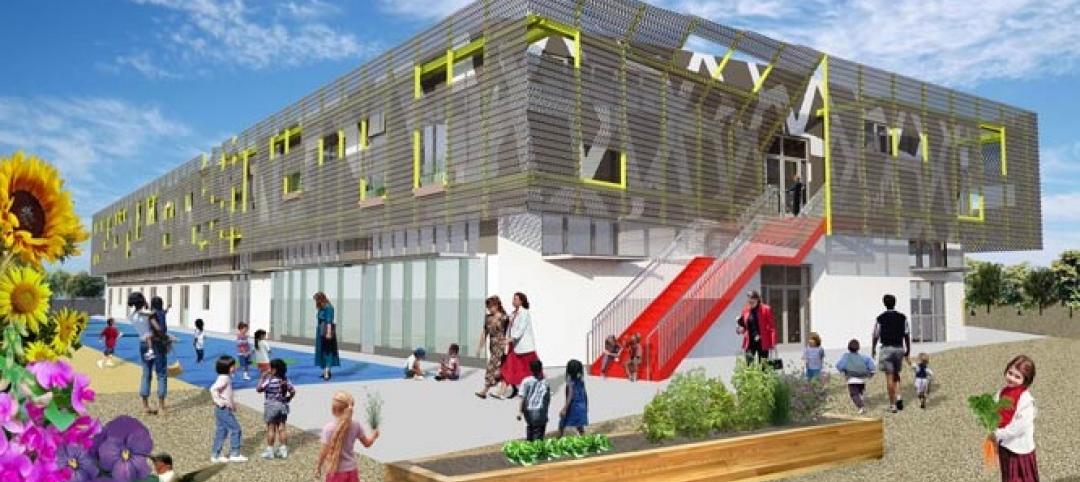The U.S. Green Building Council (USGBC) has announced the recipients of the 2014 Best of Buildings awards, as selected by fellow USGBC members.
The Best of Building Awards celebrate the year’s best products, projects, organizations and individuals making an impact in green building. Nominees and winners were selected exclusively by the members of USGBC, a vibrant and diverse community of nearly 13,000 of the world’s leading organizations invested in sustainability.
“USGBC’s membership represents a diverse community of leaders that have made significant contributions to the advancement of green building,” said Mahesh Ramanujam, chief operating officer, USGBC. “We congratulate the winners, as these peer-chosen awards reflect new and innovative achievements that are to be commended.”
There are 30, peer-selected awardees picked for 48 individual categories in the competition. Awardees were selected based on their region, size and area of specialization and are designed to showcase the most progressive, innovative organizations in the fields of green architecture, landscape, engineering, interior design and manufacturing.
Recipients include:
Non-Profit Organization
- Best Non-Profit Organization: North Shore LIJ Health System
- Best Professional Association: ASHRAE
Professional Services
- Best Architecture Firm – Small: The Gaines Group PLC
- Best Architecture Firm – Midsize: STUDIO DOMUS
- Best Architecture Firm – Large: Perkins + Will
- Best Landscape Architecture Firm – Small: Carlson Studio Architecture
- Best Landscape Architecture Firm – Midsize: Hord Coplan Macht
- Best Landscape Architecture Firm – Large: HOK
- Best Engineering Firm – Small: The Green Engineer, Inc.
- Best Engineering Firm – Midsize: ALPHA Energy & Environment GmbH
- Best Engineering Firm – Large: TLC Engineering for Architecture
- Best Interior Design Firm – Small: Inspirit LLC
- Best Interior Design Firm – Midsize: Polk Stanley Wilcox Architects
- Best Interior Design Firm – Large: Eppstein Uhen Architects
- Best Residential Design Firm – Midsize: Hord Coplan Macht
- Best Residential Design Firm – Large: GGLO
- Best Contractor/Builder – Small: Amerisips Homes
- Best Contractor/Builder – Midsize: Abrahamse & Company Builders
- Best Contractor/Builder – Large: C.T. Taylor Company, Inc.
- Best Commissioning Provider: WSP
- Best Planner: HOK
- Best Real Estate Service Contractor: CBRE (Global Energy & Sustainability Team)
Energy Service Provider/Utility
- Best Energy Service Provider/Utility: Xcel Energy
Greenbuild Exhibitor
- Greenbuild Exhibitor of the Year: Kohler Co.
Products
- Best Product for Water Efficiency: The original rainwater pillow by the Rainwater Collections Solutions, Inc.
- Best Product for Energy Efficiency: Essence by Big Ass Solutions
- Best Product for Green Cleaning: Bio-Amp by Chemsearch FE (NCH Corporation)
- Best Product for HVAC/Indoor Air Quality/Building Controls: Variable Refrigerant Flow Zoning Systems by Mitsubishi Electric US Cooling & Heating Division
- Best Product for Efficient Lighting: Big Ass High Bay LED by Big Ass Solutions
- Best Product for Exteriors: View Dynamic Glass by View, Inc.
- Best Product for Sustainable Construction Materials: Plexicrete Flooring System by Plexi-Chemie, Inc.
- Most Innovative New Product of the Year: Haiku with SenseME by Big Ass Solutions
- Product Manufacturer of the Year - Small to Midsize: Plexi-Chemie, Inc.
- Product Manufacturer of the Year – Large: Big Ass Solutions
- Real Estate/Provider Building Portfolio
- Best Building Portfolio for Retail: Renato Miranda and Associates
- Best Building Portfolio for Commercial: Paramount Group, Inc.
- Best Building Portfolio for Residential: Renato Miranda and Associates
- Best Building Portfolio for Hotels: Renato Miranda and Associates
LEED Certified Projects
- Best Project Design for LEED BD+C: U.S. Coast Guard, Cleveland Boat Maintenance Annex/Moorings (U.S. Coast Guard, AMEC)
- Best LEED ID+C Project: STUDIO DOMUS (STUDIO DOMUS)
- Best Project Design for LEED ND: Shanghai Expo UPBA Development (EXPO SHANGHAI GROUP, Arup)
- Best LEED O+M Project: 701 Brickell (TLC Engineering for Architecture, JLL, TIAA-CREF)
- Best Regional Project: Asia Pacific: 1 Bligh, Sydney, Australia (Perkins + Will)
- Best Regional Project: Europe: Centro servizi Credito Valtellinese, Italy (Deerns)
- Best Regional Project: South America: STUDIO DOMUS, Guatemala (STUDIO DOMUS)
- Best Regional Project: Middle East: KAPSARC - Saudi Arabia (HOK)
Individuals
- LEED Green Associate of the Year: Leslie R. Yager, OH, USA
- LEED AP (with Specialty) of the Year: Neil Rosen, NY, USA
Related Stories
| Feb 15, 2011
Iconic TWA terminal may reopen as a boutique hotel
The Port Authority of New York and New Jersey hopes to squeeze a hotel with about 150 rooms in the space between the old TWA terminal and the new JetBlue building. The old TWA terminal would serve as an entry to the hotel and hotel lobby, which would also contain restaurants and shops.
| Feb 15, 2011
New Orleans' rebuilt public housing architecture gets mixed reviews
The architecture of New Orleans’ new public housing is awash with optimism about how urban-design will improve residents' lives—but the changes are based on the idealism of an earlier era that’s being erased and revised.
| Feb 15, 2011
LAUSD commissions innovative prefab prototypes for future building
The LA Unified School District, under the leadership of a new facilities director, reversed course regarding prototypes for its new schools and engaged architects to create compelling kit-of-parts schemes that are largely prefabricated.
| Feb 15, 2011
New 2030 Challenge to include carbon footprint of building materials and products
Architecture 2030 has just broadened the scope of its 2030 Challenge, issuing an additional challenge regarding the climate impact of building products. The 2030 Challenge for Products aims to reduce the embodied carbon (meaning the carbon emissions equivalent) of building products 50% by 2030.
| Feb 15, 2011
New Urbanist Andrés Duany: We need a LEED Brown rating
Andrés Duany advocates a "LEED Brown" rating that would give contractors credit for using traditional but low cost measures that are not easy to quantify or certify. He described these steps as "the original green," and "what we did when we didn't have money." Ostensibly, LEED Brown would be in addition to the current Silver, Gold and Platinum ratings.
| Feb 15, 2011
AIA on President Obama's proposed $1 billion investment in energy conservation
The President’s budget increases the value of investment in energy conservation in commercial buildings by roughly $1 billion, reports AIA 2011 President Clark Manus, FAIA. The significant increase from the current tax deduction of $1.80 per sq. ft. now on the books is an increase for which the AIA has been advocating in order to encourage energy conservation.
| Feb 14, 2011
Sustainable Roofing: A Whole-Building Approach
According to sustainability experts, the first step toward designing an energy-efficient roofing system is to see roof materials and systems as an integral component of the enclosure and the building as a whole. Earn 1.0 AIA/CES learning units by studying this article and successfully completing the online exam.
| Feb 11, 2011
Four Products That Stand Up to Hurricanes
What do a panelized wall system, a newly developed roof hatch, spray polyurethane foam, and a custom-made curtain wall have in common? They’ve been extensively researched and tested for their ability to take abuse from the likes of Hurricane Katrina.













